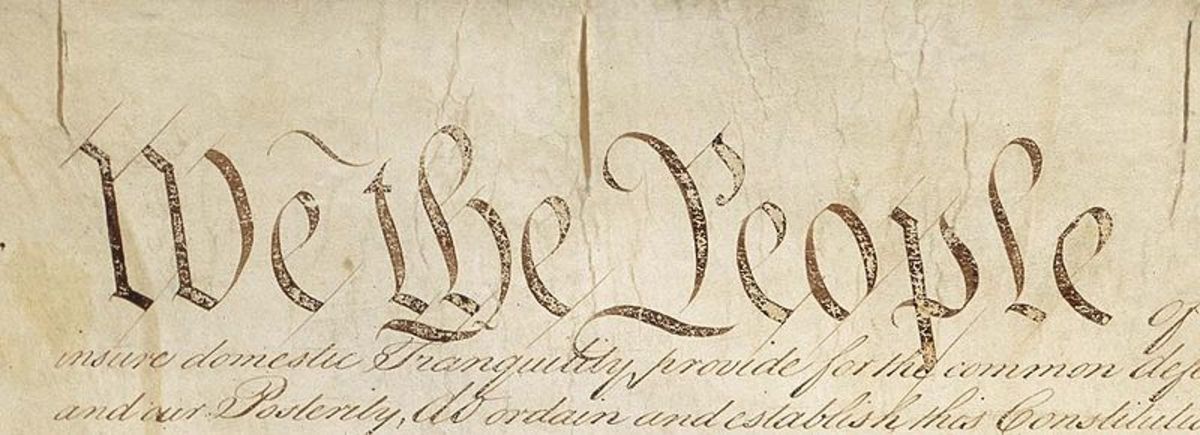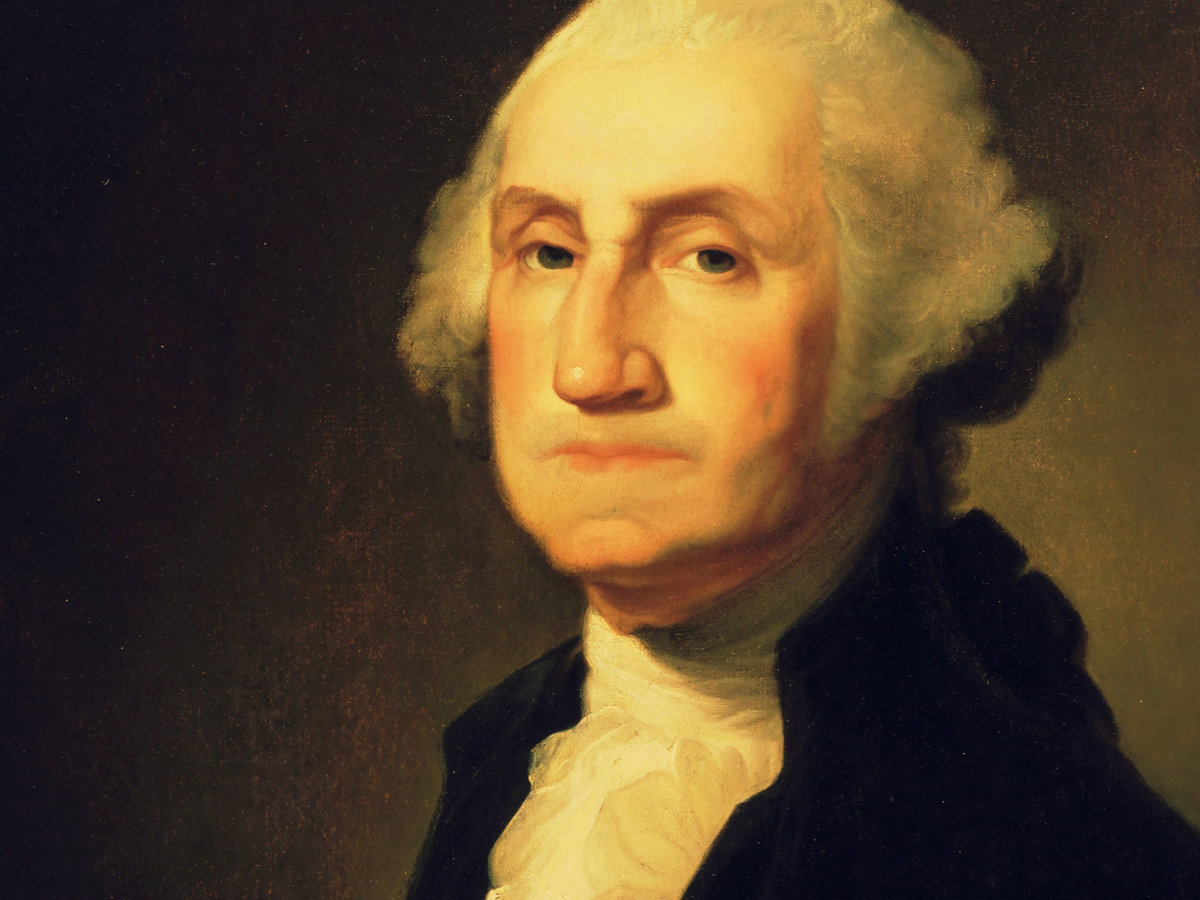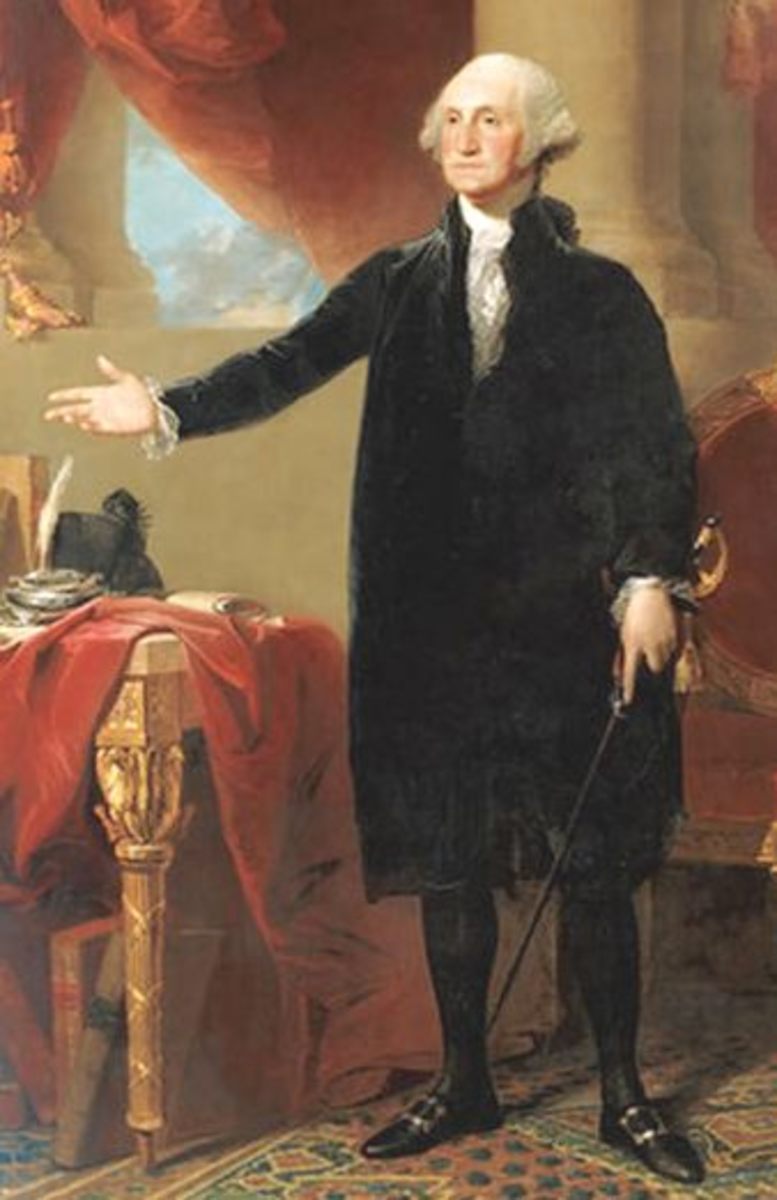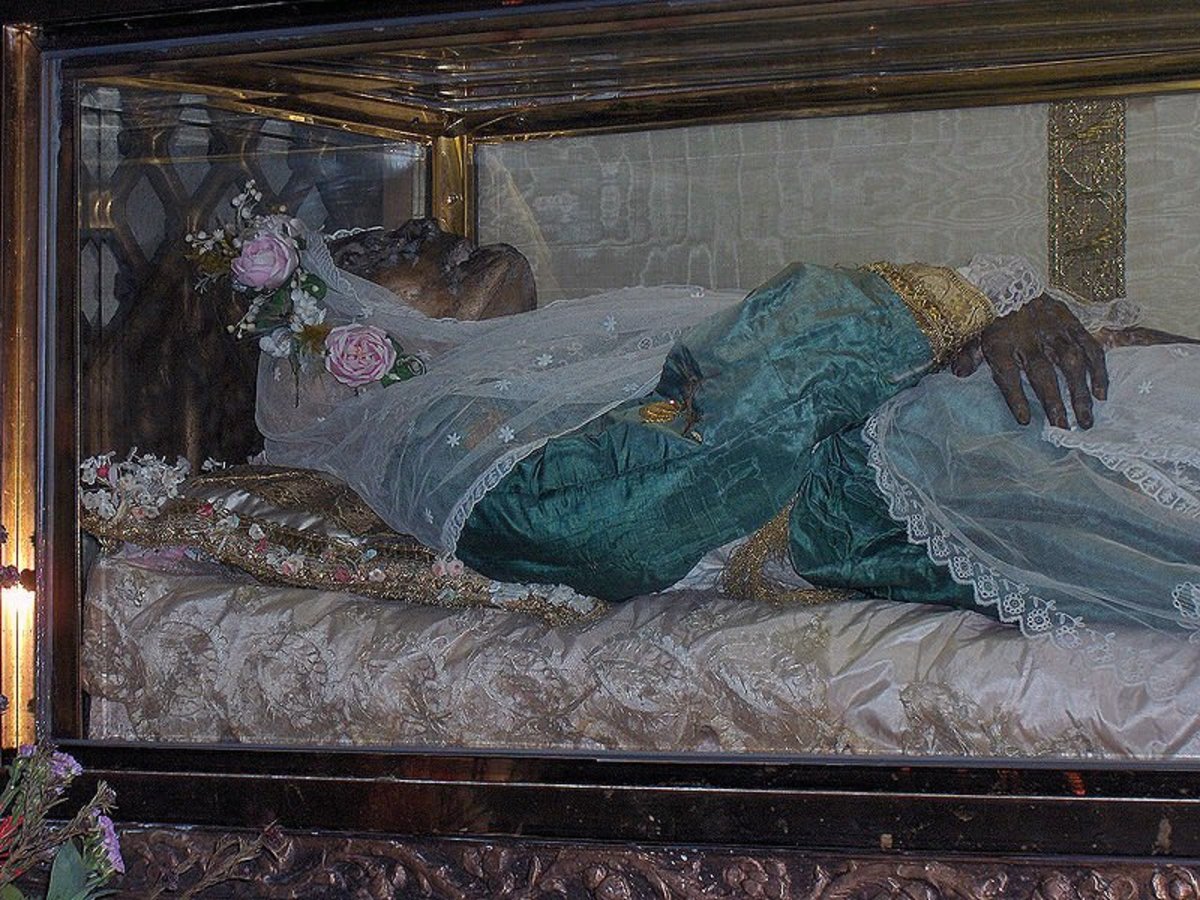Do You Know What The Amendments of the U.S. Constitution Really Say? Should You Care?
“You shall know the truth and the truth shall set you free.”
I s what you may have been taught by your professors or teachers, or what you have heard quoted by politicians about the Amendments of the U.S. Constitution correct? Have they been honest with you or have been just trying to promote their own ideology? A first century Jewish Rabbi once said, “You shall know the truth and the truth shall set you free.” It is for this reason that I am starting a 6-part series on the Amendments of the U.S. Constitution covering 3 to 5 amendments in depth at a time. I hope it will be enjoyable as well as educational for you the reader.
First off let’s see what the wording of the 1st Amendment is. Is it—
a. Congress shall make a law respecting an establishment of religion that is deemed politically correct and shall prohibit the free exercise of any other religion that is not politically correct, the right of the people to free speech, the press or the right to peaceably assemble shall be limited to those who are granted permission by the President and the right to petition the Government for a redress of grievances shall also be granted by the President. Sorry, that’s not the right one. Ok, how about---
b. Congress shall make no law respecting the place or manner of worship of any religion, but it can prohibit the free exercise thereof meaning it can force a citizen to go against his or her own conscience of what his or her religion forbids them to do. Freedom of speech and the press shall be limited to that which will not offend or challenge anyone’s beliefs. The right to peacefully assemble and to voice one’s displeasure or grievance to the government shall not be tolerated. No, wrong again! Then, how about---
c. Congress shall make sure that there is a separation between Church and State. In that no person of faith whether of the clergy or ordinary person shall have a say on any laws or be able to run for elected office. The freedom of speech and the press shall be limited to that which is the friendly to the President. The right to peacefully assemble and to petition the Government for a redress of grievances shall be granted to the politically correct only. Darn it, wrong again!
d. Congress shall make no law respecting an establishment of religion, or prohibiting the free exercise thereof, or abridging the freedom of speech, or of the press; or the right of the people peaceable to assemble, and to petition the Government for a redress of grievances. Yes, finally we found the right one!
Now that we figured that one out. Let us look at some of the writings of the Founding Fathers to see what their mindset was when they made the final decision of the wording of the 1st amendment.
Please note to make this article easier to read I have shortened some of the quotes since some of them are extremely long. Also, during the 18th and early 19th century the rules of grammar and spelling were not the same as they are today.
From Document 11
Delaware Charter of 1701, ARTS. 1, 8
Thorpe 1:558, 560--61
Because no People can be truly happy, though under the greatest Enjoyment of Civil Liberties, if abridged of the Freedom of their Consciences, as to their Religious Profession and Worship: And Almighty God being the only Lord of Conscience, Father of Lights and Spirits; and the Author as well as Object of all divine Knowledge, Faith and Worship, who only doth enlighten the Minds, and persuade and convince the Understandings of People, I do hereby grant and declare, That no Person or Persons, inhabiting in this Province or Territories, who shall confess and acknowledge One almighty God, the Creator, Upholder and Ruler of the World; and professes him or themselves obliged to live quietly under the Civil Government, shall be in any Case molested or prejudiced, in his or their Person or Estate, because of his or their conscientious Persuasion or Practice, nor be compelled to frequent or maintain any religious Worship, Place or Ministry, contrary to his or their Mind, or to do or suffer any other Act or Thing, contrary to their religious Persuasion. (1)
From Document 37
Thomas Jefferson, A Bill for Establishing Religious Freedom
12 June 1779 Papers 2: facing 305
Well aware that the opinions and belief of men depend not on their own will, but follow involuntarily the evidence proposed to their minds, that Almighty God hath created the mind free, and manifested his Supreme will that free it shall remain, by making it altogether insusceptible of restraint: That all attempts to influence it by temporal punishments or burthens, or by civil incapacitations, tend only to beget habits of hypocrisy and meanness, and are a departure from the plan of the holy author of our religion, who being Lord both of body and mind, yet chose not to propagate it by coercions on either, as was in his Almighty power to do, but to extend it by its influence on reason alone: That the impious presumption of legislators and rulers, civil as well as ecclesiastical, who, being themselves but fallible and uninspired men, have assumed dominion over the faith of others, setting up their own opinions and modes of thinking, as the only true and infallible, and as such, endeavoring to impose them on others, hath established and maintained false religions over the greatest part of the world, and through all time: That to compel a man to furnish contributions of money for the propagation of opinions which he disbelieves and abhors, is sinful and tyrannical: (2)
From Document 58
Thomas Jefferson to Danbury Baptist Association
1 Jan. 1802 Writings 16:281
Believing with you that religion is a matter which lies solely between man and his God, that he owes account to none other for his faith or his worship, that the legislative powers of government reach actions only, and not opinions, I contemplate with sovereign reverence that act of the whole American people which declared that their legislature should "make no law respecting an establishment of religion, or prohibiting the free exercise thereof," thus building a wall of separation between Church and State. Adhering to this expression of the supreme will of the nation in behalf of the rights of conscience, I shall see with sincere satisfaction the progress of those sentiments which tend to restore to man all his natural rights, convinced he has no natural right in opposition to his social duties. (3)
News flash! Religious freedom/ freedom of conscience is not just a Civil Right it is a Human Right!
Now that you had a chance to read these statements is there any mention of respecting a certain establishment of religion or prohibiting a certain type of religion. In other words, for example, did any of the Founding Fathers say that official legitimate religion of the United States of America should be Presbyterianism and that all other religions should be banned? Obviously not! There is no Church of the United States like, for example, The Church of England. People of all faiths and those of no faith are welcome to become citizens of our nation. In their writings is there mention of freedom of worship, in other words, the style that should be allowed when one decides to worship. Again, obviously not! What the Founding Fathers were concerned about was that no one should be forced to be compelled to act in a certain way or believe in a certain way that violated their religious convictions in other words their conscience.To those who like to spout out the slogan Separation of Church and State, please note that those words are mentioned in the letter from Thomas Jefferson to the Danbury Baptist Association not in the 1st Amendment of the Constitution, and it wasn't about the government dictating what the church should or should not be allowed to say but about that the government should not be dictating to any faith how they live out their faith. It is very disingenuous when one cynically equates, for example, a member of the clergy who refuses to facilitate in a same sex marriage with some clerk at a checkout counter who refuses to give service to someone because of who they are. That is comparing oranges to apples.
The reason why there are clergy members that refuse to facilitate in a same sex marriage is that they believe that in so doing they would be committing an act of blasphemy against the deity that they worship not, as some politicians have so sarcastically have suggested, as an attempt to deny some people their civil rights. There are plenty of liberal clergy that would be happy to marry them, and of course there are secular judges who would be willing to do the marriage ceremony also, therefore how are their rights being denied? News flash! Religious freedom/ freedom of conscience is not just a Civil Right it is a Human Right!
Now let's look at the 2nd clause of the 1st Amendment that which pertains to freedom of speech, freedom of the press, the right of the people to peaceably to assemble, and the right to petition the Government for redress of grievances. See if you can spot whether or not the Founding Fathers had any restrictions of the type of speech, freedom of the press and the right of the people to peaceably to assemble in the following documented writings of theirs.
From Document 22
James Iredell, Charge to the Grand Jury, in Case of Fries
9 Fed. Cas. 829, no. 5,126 C.C.D.Pa. 1799
"The liberty of the press is indeed essential to the nature of a free state. And this consists in laying no previous restraints upon publications, and not in freedom from censure for criminal matter when published. Every freeman has an undoubted right to lay what sentiments he pleases before the public; to forbid this, is to destroy the freedom of the press: but if he publishes what is improper, mischievous, or illegal, he must take the consequence of his own temerity. To subject the press to the restrictive power of a licenser, as was formerly done, both before and since theRevolution, is to subject all freedom of sentiment to the prejudices of one man, and make him the arbitrary and infallible judge of all controversial points in learning, religion, and government. But to punish (as the law does at present) any dangerous or offensive writings, which, when published, shall,on a fair and impartial trial, be adjudged of a pernicious tendency, is necessary for the preservation of peace and good order, of government and religion, the only solid foundations of civil liberty. Thus the will of individuals is still left free; the abuse only of that free will is the object of legal punishment. Neither is any restraint hereby laid upon freedom of thought or inquiry: liberty of private sentiment is still left; the disseminating, or making public, of bad sentiments, destructive of the ends of society, is the crime which society corrects. (4)
From Document 15
Massachusetts Constitution of 1780, PT. 1, ART. 19
Thorpe 3:1892
Art. XIX. The people have a right, in an orderly and peaceable manner, to assemble to consult upon the common good; give instructions to their representatives, and to request of the legislative body, by the way of addresses, petitions, or emonstrances, redress of the wrongs done them, and of the grievances they suffer. (5)
From Document 15
Thomas Jefferson to James Madison
28 Aug. 1789 Papers 15:367
. . . the following alterations and additions would have pleased me. Art 4. "The people shall not be deprived or abridged of their right to speak to write or otherwise to publish anything but false facts affecting injuriously the life, property, or reputation of others or affecting the peace of the confederacy with foreign nations." (6)
Now that you have had a chance to review these writings from the Founding Fathers, in regards to the 2nd clause of the 1st Amendment did they want to limit the freedom of speech, the press and to peacefully assemble and to have the right to petition the Government for a redress of grievances to apply only to those of a certain political persuasion or to those who hold a certain faith, etc.? Clearly not! The only exceptions they made to these freedoms were in the area of libel were someone's reputation and livelihood was put in jeopardy because of a malicious lie, and in unpeaceful assemblies since because of the grave danger against life and property.
In regards to forbidding libel this gives any citizen who has been harmed by libel the right to seek justice in a court of law, and when it comes to forbidding unpeaceful assemblies, such as riots, this restriction gives all citizens the right not to be harmed by mob violence. I find it very disingenuous and hypocritical when the Leftist accuse those, for example, who are quietly protesting for Life and they are not getting in anyone’s way and they are not being abusive in any way are considered violent, however, if a bunch of Antifa members beat up a feeble elderly person that is considered peaceful.
Now for the 2nd Amendment: Let's first determine what the 2nd Amendment actually says and then what it actually means. Which of the following statements are correct?
a. A well-regulated Militia shall consist of the Military and the Police force, the right of the people to keep and bear arms shall be limited to the above class of people. This one is the correct statement! Right? Wrong!! Ok, how about...
b. A well-regulated Militia is not necessary to the security of a free State since we have progress and the State with its military and police force can be trusted not to harm the people. Thus, gun control is a virtue. Sorry, wrong again! And lastly, how about
c. A well-regulated Militia, being necessary to the security of a free State, the right of the people to keep and bear Arms, shall not be infringed. Yes, this is the correct statement.
Before we continue with looking into the mindset of the Founding Fathers when they wrote the 2nd Amendment, please notice the phrasing. Do you notice it says the right of the people to keep and bear Arms, shall not be infringed? So, what is meant by a well-regulated Militia? Let's now take a look at the actual writings of the Founding Fathers in regard to this issue.
From Document 4
William Blackstone, Commentaries 1:139
1765
The fifth and last auxiliary right of the subject, that I shall at present mention, is that of having arms for their defense, suitable to their condition and degree, and such as are allowed by law. Which is also declared by the same statute I W. & M. st. 2. c. 2. and is indeed a public allowance, under due restrictions, of the natural right of resistance and self-preservation, when the sanctions of society and laws are found insufficient to restrain the violence of oppression. (7)
From Document 7
St. George Tucker, Blackstone's Commentaries 1:App. 300
1803
This may be considered as the true palladium of liberty. . . . The right of self-defense is the first law of nature: in most governments it has been the study of rulers to confine this right within the narrowest limits possible. Wherever standing armies are kept up, and the right of the people to keep and bear arms is, under any color or pretext whatsoever, prohibited, liberty, if not already annihilated, is on the brink of destruction. In England, the people have been disarmed, generally, under the specious pretext of preserving the game: a never-failing lure to bring over the landed aristocracy to support any measure, under that mask, though calculated for very different purposes. True it is their bill of rights seems at first view to counteract this policy: but the right of bearing arms is confined to protestants, and the words suitable to their condition and degree, have been interpreted to authorize the prohibition of keeping a gun or other engine for the destruction of game, to any farmer, or inferior tradesman, or other person not qualified to kill game. So that not one man in five hundred can keep a gun in his house without being subject to a penalty. (8)
From Document 6
House of Representatives, Amendments to the Constitution
17, 20 Aug. 1789
Annals 1:749--52, 766--67
[17 Aug.]
What, sir, is the use of a militia? It is to prevent the establishment of a standing army, the bane of liberty. Now, it must be evident, that, under this provision, together with their other powers, Congress could take such measures with respect to a militia, as to make a standing army necessary. Whenever Governments mean to invade the rights and liberties of the people, they always attempt to destroy the
militia, in order to raise an army upon their ruins. This was actually done by Great Britain at the commencement of the late revolution. They used every means in their power to prevent the establishment of an effective militia to the eastward. The Assembly of Massachusetts, seeing the rapid progress that administration were making to divest them of their inherent privileges, endeavored to counteract them by the organization of the militia; but they were always defeated by the influence of the Crown (9)
Clearly the reason for the 2nd amendment is so that we, the ordinary people, can defend ourselves against a tyrannical government either foreign or domestic who would dare take away our freedoms or worse yet even our very lives.
Now that you have had a chance to review the writings of the Founding Fathers in regards to the second amendment does it mean that the militia refers to the military forces of the government or others of authority and thus the ordinary people do not have the right to bear arms? Absolutely not! Please look carefully at the phrasing of the 2nd amendment it says: A well-regulated Militia, being necessary to the security of a free State, the right of the people to keep and bear Arms, shall not be infringed. Also did they mention anything about arms should only be for hunting in their writings? Of course not! Clearly the reason for the 2nd amendment is so that we, the ordinary people, can defend ourselves against a tyrannical government either foreign or domestic who would dare take away our freedoms or worse yet even our very lives.
Lastly, for this part of the series, let's take a look at the 3rd amendment.
Which statement is correct in regarding the 3rd amendments? Is it--
a. Any soldier whether a part of the United States military or that a foreign entity granted permission by the government of the United States shall be quartered in any house when it is deemed necessary by the president with or without the consent of the owner of the house. Nope! How about---
b. Only a soldier of the United States military shall be given granted permission by the government of the United States shall be quartered in any house when it is deemed necessary by the president with or without the consent of the owner of the house. Once again, the answer is No! How about--
C. No Soldier shall, in time of peace be quartered in any house, without the consent of the Owner, nor in time of war, but in a manner to be described to be prescribed by law. Yes, this is the correct wording of the 3rd amendment.
Now let's look like some of the writings of the Founding Fathers to see why they wrote the 3rd Amendment like they did.
From Document 8
Debate in Virginia Ratifying Convention
16 June 1788 Elliot 3:411, 413
[Mr. Henry:] . . . One of our first complaints, under the former government, was the quartering of troops upon us. This was one of the principal reasons for dissolving the connection with Great Britain. Here we may have troops in time of peace. They may be billeted in any manner--to tyrannize, oppress, and crush us..
[Mr. Madison:] . . . He says that one ground of complaint, at the beginning of the revolution, was, that a standing army was quartered upon us. This was not the whole complaint. We complained because it was done without the local authority of this country--without the consent of the people of America. As to the exclusion of standing armies in the bill of rights of the states, we shall find that though, in one or two of them, there is something like a prohibition, yet, in most of them, it is only provided that no armies shall be kept without the legislative authority; that is, without the consent of the community itself. Where is the impropriety of saying that we shall have an army, if necessary? Does not the notoriety of this constitute security? If inimical nations were to fall upon us when defenseless, what would be the consequence? Would it be wise to say, that we should have no defense? Give me leave to say, that the only possible way to provide against standing armies is to make them unnecessary. (10)
Samuel Adams, Boston Gazette
17 Oct. 1768
Writings 1:251--53
"Where Law ends, (says Mr. Locke) TYRANNY begins, if the Law be transgressed to another’s harm": No one I believe will deny the truth of the observation, and therefore I again appeal to common sense, whether the act which provides for the quartering and billeting the King's troops, was not TRANSGRESS'D, when the barracks at the Castle WHICH ARE SUFFICIENT TO CONTAIN MORE than the whole number of soldiers now in this town, were ABSOLUTELY REFUS'D: This I presume cannot be contested. Should anyone say that the law is not transgressed "to another’s harm," the assertion I dare say would contradict the feelings of every sober householder in the town. No man can pretend to say that the peace and good order of the community is so secure with soldiers quartered in the body of a city as without them. Besides, where military power is introduced, military maxims are propagated and adopted, which are inconsistent with and must soon eradicate every idea of civil government. Do we not already find some persons weak enough to believe, that an officer is obliged to obey the orders of his superior, though' it be even AGAINST the law! And let anyone consider whether this doctrine does not directly lead even to the setting up that superior officer, whoever he may be, as a tyrant. It is moreover to be observed that military government and civil, are so different from each other, if not opposite, that they cannot long subsist together. Soldiers are not governed properly by the laws of their country, but by a law made for them only: This may in time make them look upon themselves as a body of men different from the rest of the people; (11)
It should be obvious that the reason behind the 3rd amendment is to keep the ordinary citizens of our country safe from abuse from military powers
It should be obvious that the reason behind the 3rd amendment is to keep the ordinary citizens of our country safe from abuse from military powers. Throughout history whenever a military group has taken over a home for their use it has often result in people being deprived if their food, and in some cases the women and girls being sexually abused. Please note, I am not trying to lump all who are in our military in that category. I have friends and family members who have served in our country’s Arm Forces
To those who just finished reading this article who are citizens of the U.S.A. I hope this has whetted your appetite for finding out what your rights are and why they are important. When freedom is sacrifice for safety and having your personal needs met it eventually ends up in people losing everything.
Research Sources:
The Founders' Constitution (1)
Volume 5, Amendment I (Religion), Document 11
http://press-pubs.uchicago.edu/founders/documents/amendI_religions11.html
The University of Chicago Press
Thorpe, Francis Newton, ed. The Federal and State Constitutions, Colonial Charters, and Other Organic Laws of the States, Territories, and Colonies Now or Heretofore Forming the United States of America. 7 vols. Washington, D.C.: Government Printing Office, 1909.
The Founders' Constitution
Volume 5, Amendment I (Religion), Document 37
http://press-pubs.uchicago.edu/founders/documents/amendI_religions37.html
The University of Chicago Press The Papers of Thomas Jefferson. Edited by Julian P. Boyd et al. Princeton: Princeton University Press, 1950--. (2)
The Founders' Constitution
Volume 5, Amendment I (Religion), Document 58
http://press-pubs.uchicago.edu/founders/documents/amendI_religions58.html
The University of Chicago Press
The Writings of Thomas Jefferson. Edited by Andrew A. Lipscomb and Albert Ellery Bergh. 20 vols. Washington: Thomas Jefferson Memorial Association, 1905. (3)
The Founders' Constitution
Volume 5, Amendment I (Speech and Press), Document 22
http://press-pubs.uchicago.edu/founders/documents/amendI_speechs22.html
The University of Chicago Press (4)
The Founders' Constitution
Volume 5, Amendment I (Petition and Assembly), Document 15
http://press-pubs.uchicago.edu/founders/documents/amendI_assemblys15.html
The University of Chicago Press
Thorpe, Francis Newton, ed. The Federal and State Constitutions, Colonial Charters, and Other Organic Laws of the States, Territories, and Colonies Now or Heretofore Forming the United States of America. 7 vols. Washington, D.C.: Government Printing Office, 1909. (5)
The Founders' Constitution (6)
Volume 5, Amendment I (Speech and Press), Document 15
http://press-pubs.uchicago.edu/founders/documents/amendI_speechs15.html
The University of Chicago Press
The Founders' Constitution (7)
Volume 5, Amendment II, Document 4
http://press-pubs.uchicago.edu/founders/documents/amendIIs4.html
The University of Chicago Press
Blackstone, William. Commentaries on the Laws of England: A Facsimile of the First Edition of 1765--1769. Chicago: University of Chicago Press, 1979.
The Founders' Constitution (8)
Volume 5, Amendment II, Document 7
http://press-pubs.uchicago.edu/founders/documents/amendIIs7.html
The University of Chicago Press
Tucker, St. George. Blackstone's Commentaries: With Notes of Reference to the Constitution and Laws of the Federal Government of the United States and of the Commonwealth of Virginia. 5 vols.
Philadelphia, 1803. Reprint. South Hackensack, N.J.: Rothman Reprints, 1969.
http://press-pubs.uchicago.edu/founders/documents/amendIIs6.html (9)
The University of Chicago Press
Annals of Congress. The Debates and Proceedings in the Congress of the United States. "History of
Congress." 42 vols. Washington, D.C.: Gales & Seaton, 1834--56.
The Founders' Constitution
Volume 5, Amendment III, Document 8
http://press-pubs.uchicago.edu/founders/documents/amendIIIs8.html
The University of Chicago Press
Elliot, Jonathan, ed. The Debates in the Several State Conventions on the Adoption of the Federal
Constitution as Recommended by the General Convention at Philadelphia in 1787. . . . 5 vols. 2d ed.
1888. Reprint. New York: Burt Franklin, n.d. (10)
The Founders' Constitution (11)
Volume 5, Amendment III, Document 2
http://press-pubs.uchicago.edu/founders/documents/amendIIIs2.html
The University of Chicago Press
The Writings of Samuel Adams. Edited by Harry Alonzo Cushing. 4 vols. New York: G. P. Putnam's
Sons, 1904—8








